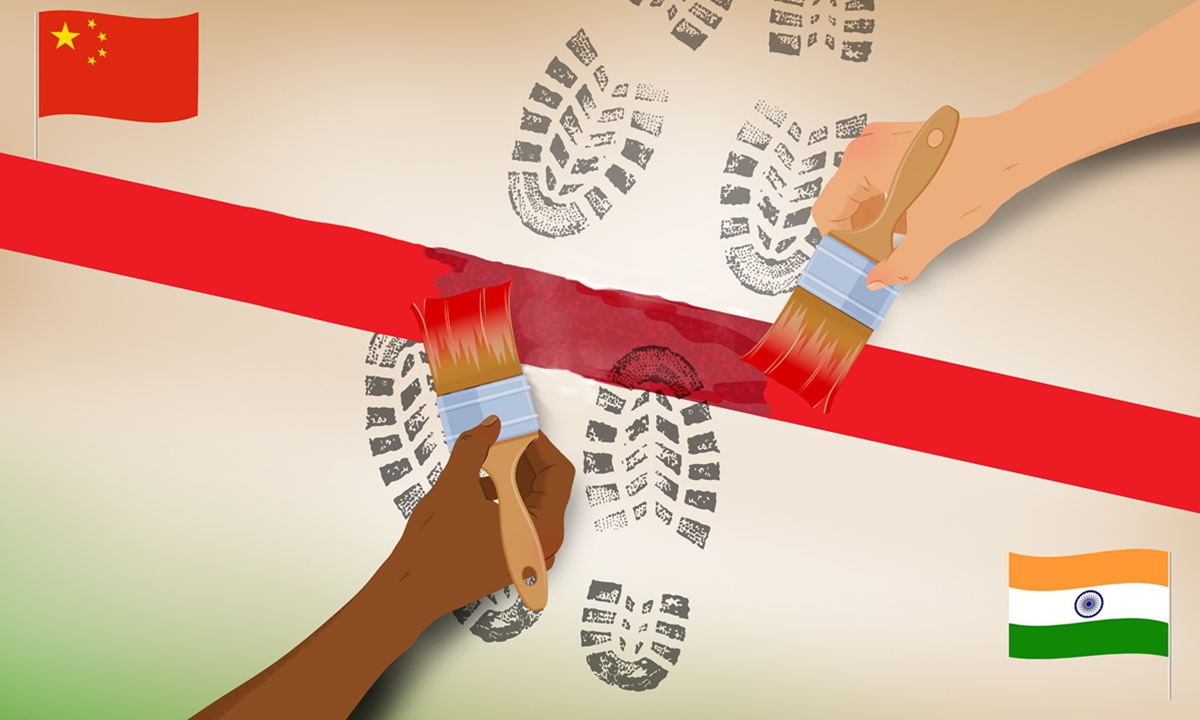
China India Photo: GT
The Indian military on Thursday told the Supreme Court: If the Indian Army cannot move its missile launchers and heavy machinery up to the northern China-India border, then how will it defend it and fight a war if it breaks out? The remarks were made when the Indian military requested to expand the Char Dham project roads leading to India-China border.The Indian military's position on moving missile launchers to the border is clearly sending signals to China, showing New Delhi's hard-line stance against Beijing. But if India wants to deter China by virtue of this position, the country cannot achieve it. Once a military conflict breaks out between China and India, it is a contest of overall national strength between the two countries. An overall situation will not change due to partial deployment.
India (especially its military and media outlets) has spared no effort hyping the "China threat," especially since the Galwan Valley conflict of June 2020. This is mainly because the Modi government requires an external target to solidify its forces and gain support. This is a bid to divert domestic attention on voices criticizing the Modi government. The so-called China threat is just one of such an excuse.
But the "China threat" does not exist. China has not been at war for decades. China has settled territorial disputes with many neighboring countries through peaceful negotiations. China is willing to deal with China-India border disputes by peaceful means as well.
India should also be very clear about China's such intent. In the past decades, border disputes and contradictions have always existed between China and India, but the peace and tranquility have been maintained for decades. This indicates that these disputes do not necessarily lead to conflict, confrontation or even war between China and India. It is all about how the two countries see and deal with these disputes.
However, for the sake of elections, the Indian government sometimes exploits the border disputes with China to serve its political goal. Against such backdrop, the situation between China and India will become tense. The responsibility is totally on the Indian side.
When attending a summit on Thursday evening, General Bipin Rawat, India's Chief of Defense Staff, said China is the biggest security threat facing India.
If New Delhi insists on seeing Beijing as a threat for the sake of politics, engaging in moves such as provoking China at border, inciting radical nationalist sentiment against China, and leading or joining anti-China campaigns internationally, Beijing will respond accordingly when these moves threaten China's national security.
Consequently, frictions between China and India may be radicalized, turning China into a real "threat" to India. After all, China is much stronger in terms of national power. Therefore, the genuine threat to India is its own miscalculated strategy and diplomacy and the unrealistic nationalism ignited by irresponsible politicians and media.
Since the border frictions last year, New Delhi has repeatedly flexed its muscles. But behind such moves is the mentality of a loser. India still cannot let go the complete 1962 defeat to China, and wants to wipe the shame off one day. However, it doesn't have enough strength to do so. This being the case, the Indian government is trying to tell Indian society that their government and military are capable so as to gain political support domestically. While internationally, India needs to show its muscle to make other smaller South Asian countries surrender.
Rawat also said, "India needs the United States and Russia, both… We need both to be on our sides if we have to fight China if the need arises." This shows that India has admitted to the fact that it is weak - and it has no confidence in such a war.
If a war really breaks out between China and India, the US will take the Indian side for sure. It will support anything that jeopardizes China without judging if it is just. However, Washington will unlikely send troops. Intelligence sharing can be a possible partnership, as well as arms sales to India, economic assistance, and condemnation of China in the international community.
Given the current international landscape, it is impossible for Russia to take sides with India. At most, Moscow will do something to mediate while keeping neutral. As a matter of fact, Russia is not satisfied with India's move of tilting toward the US. So it is more of India's wishful thinking to gain support from Russia.
Rawat's statement was actually made to embolden India. This reveals that India is not militarily capable, nor does it have confidence to fight China.
The author is a senior research fellow with the Academy of Regional and Global Governance at the Beijing Foreign Studies University and president of the Chengdu Institute of World Affairs. opinion@globaltimes.com.cn


